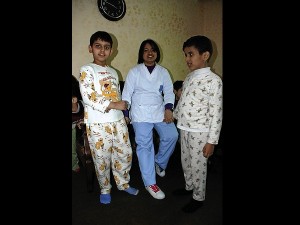PH nurses teach Jordan kids to say ‘mahal kita’
AMMAN, Jordan—Filipino nurse Aizel Mendoza remembers the very first words spoken by her young Arab ward at the Autism Academy of Jordan.
They were: “Mahal kita (I love you).”
Later on, he would also learn to tease her in Cebuano: “Ambot sa imo (Suit yourself).”
Filipino nurses are apparently doing well in Jordan, where they can be found manning the ICUs (intensive care units) in top hospitals or helping children with autism fall asleep by telling them Filipino words of endearment.
“At the start, he did not know how to speak. He would just hum. Every day I would greet him and one day he just answered back: ‘Mahal kita.’ I was so happy,” said Mendoza, who had once dealt with grown-up wards at the National Center for Mental Health in Mandaluyong.
“Now, when I greet him, he replies, ‘mabuti,’” she added.
Mendoza is one of eight
Filipino female nurses who arrived nine months ago at the Academy, which takes care children with autism or other mental handicaps from several places across the Middle East, like Oman, Bahrain, Dubai, and Saudi Arabia.
The owner, doctor Jamal
Addalamah, plans to build more buildings, enlarge the academy, and hire more nurses from the Philippines.
“He said he trusted the nurses from the Philippines. He also said his friends in other hospitals had highly recommended
Filipino nurses, who are known to be good at their work,”
Mendoza said.
Hospital officials expect to hire even more Filipinos as the country promotes itself as the medical tourism capital of the Middle East.
“Filipino nurses have gained a good reputation in the Arab world as being hard working and devoted,” said Mohammad Jarrah, the human resources and training manager at the Al Khalidi Medical Center, which is known as the top boutique-hospital in Amman.
“You see this lady dressed in white who showers every day… The customers feel happy about it. (Filipino nurses) provide excellent healthcare to patients and generally speaking, they’re the best employees in their jobs,” he said.
Muznah Al-Khatib, who is in charge of nurses at Al Khalidi, said their ICU patients who have Filipinos as their attending nurses often request that they be retained even after they are transferred to regular rooms.
The elite hospital already has 30 Filipino nurses and is expecting another batch of 19 from the Philippines.
“We are very lucky we got the 19. After that, it would be very difficult getting more because we are starting to have unemployment among Jordanian nurses,” Jarrah said.
“There are rules and regulations from the Ministry of Labor and the nurses association that restrict the number of foreign nurses coming in,” he added.
Nevertheless, Jarrah said that he expected the demand for
Filipino nurses to increase not just in Jordan but also across the Middle East.
$600 starting salary
He said even though it costs twice as much to hire a Filipino nurse than a local, Al Khalidi would still try to get nurses from the Philippines who at least have three years experience in hospitals. Filipino nurses in hospitals here get around $600 and receive more training once they arrive at Al Khalidi in preparation for them to get their Jordanian license.
“There is going to be a high demand for female Filipino nurses for many reasons. First is the number of hospitals that are being started in the Middle East because people here are starting to look at their medical needs as among their first priorities,” he said.
Walid N. Maaytah, the marketing director of Al Khalidi, said the Philippines was the “first choice” for hospitals in Amman scouting for foreign nurses.
“I see the demand increasing more and more, year by year. It’s been known that the most famous places in the world for excellent nursing is the Philippines and India. Everywhere, it is the same… in the United Kingdom, in Jordan, and in the Gulf, and that will continue,” said Maaytah.
But what would entice Filipinos to choose Jordan instead of other countries in the region?
Maaytah and Jarrah said unlike in other Arab countries that have closed, conservative societies with strict rules for foreigners, Filipino nurses would feel more at home in Jordan as it is relatively more Western-oriented.
“The most important thing is this: It is a safe country. Jordanians are hospitable. You can go out and easily move around at night and stay late,” Maaytah said.
“And if you go ask Jordanians, they will say that they like
Filipinos because they feel that they’re tidy, devoted, committed to their work, and they’re very, very polite,” he added.
Jarrah said that Jordan, which has no oil deposits, is similar to the Philippines in the sense that it also relies on its human capital. Many Jordanians work and study abroad, to help improve its economy.
“Probably this is partly why we get along very easily.
(Filipino nurses) are also devoted to their work. I see a pattern of life that is the same,” Jarrah said.
“Jordan is an open society and is westernized. We try in Jordan to mix tradition with all that is good in Western society, and mix this into something unique,” he said.
Al Khalidi nurse Mariela S. Fabellar said she had a job offer in Saudi Arabia but she chose Jordan because “it is a peaceful country.”
“It’s not like in Saudi where we have limited movement. I can have a very peaceful life here and Jordanians are very respectful. When it comes to dealing with doctors and colleagues, they’re very cooperative and very professional,” Fabellar said.
Her colleague Lhen Mae Tresplacios said she has gained a lot of experience while participating in surgeries in the hospital.
“We have open heart surgery here almost every day,” Tresplacios said.
While Filipino nurses are allowed to work in Jordan, Manila still has a standing ban on the deployment ban of domestic workers in Jordan. The ban was imposed in 2008 due to the rising number of abuses there. Last
January, Labor Secretary Rosalinda Baldoz signed an agreement with her counterpart in Amman, Jordanian Labor Minister Maher Al Waked, to pave the way for the lifting of the ban.
However, Baldoz said domestic abuses should be resolved first before the ban if lifted.
Jordan is one of the few countries in the Middle East that officially supports labor reform for domestic workers. But as in the Philippines, implementation requires vigilance.
















